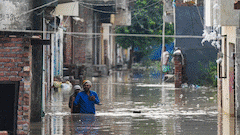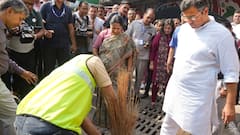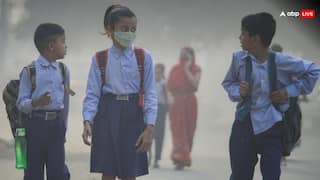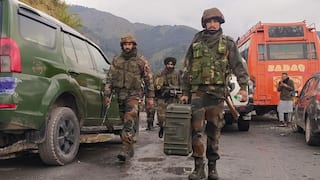GRAP Stage 4 Invoked In Delhi-NCR As AQI Dips To 'Severe Plus' Again, Know Curbs To Be Enforced
Delhi Air Pollution: Under GRAP Stage 4, entry for polluting trucks and commercial four-wheelers is prohibited in NCR, work-from-home directions will be issued for 50% of the staff in government and private offices.

The Commission for Air Quality Management (CAQM) on Sunday decided to invoke Stage IV of the GRAP in the entire NCR with immediate effect, in addition to all actions under Stage I, II, and III to prevent further deterioration of air quality in the region, news agency PTI reported. These measures come as part of the final stage of the pollution control plan and are implemented at least three days before the Air Quality Index (AQI) exceeds the 450 mark in the national capital.
Delhi's air quality entered the 'severe plus' category due to unfavourable wind conditions, increased farm fires in north India, and other local pollution sources.
The CAQM, a statutory body responsible for devising strategies to combat pollution in the region, has called on Delhi and the NCR states to enforce a series of emergency measures. These measures include directives for 50 per cent of government and private office staff to work from home as well as a ban on construction work related to linear public projects
- Under Stage IV of the Graded Response Action Plan, only CNG, electric, and BS VI-compliant vehicles from other states are allowed to enter Delhi. Exceptions are granted to vehicles engaged in essential services. Moreover, all medium and heavy goods vehicles not involved in essential services are banned from entering the capital, as per the latest CAQM order.
- The Delhi government has called for an emergency meeting on Monday to discuss and implement stricter curbs as part of the final stage of the air pollution control plan, PTI reported.
-
The Delhi government's Transport Department also imposed a ban on truck entry, except for those carrying essential items. Additionally, the order prohibits the entry of light commercial vehicles registered outside Delhi, with exceptions for electric vehicles, CNG, and BS VI-compliant vehicles, provided they carry essential commodities. Delhi-registered diesel-operated Medium Goods Vehicles (MGVs) and Heavy Goods Vehicles (HGV) are also banned, except when transporting essential commodities.
-
The Ministry of Environment, Forest and Climate Change that NCR State Governments and the Delhi Government may consider discontinuing physical classes for students in classes VI to IX and class XI. Instead, they are advised to conduct lessons in an online mode to protect students from the harmful effects of air pollution.
State Governments have also been advised to consider the closure of colleges and educational institutions to protect students and staff from the health risks associated with poor air quality. -
NCR State Governments and GNCTD are encouraged to make decisions regarding the operation of public, municipal, and private offices. They may consider allowing 50% of office staff to work from home, reducing the concentration of people in indoor environments where pollution levels may be high, the ministry stated.
The Union Government is also urged to take appropriate decisions regarding permitting employees in Central Government offices to work from home.
-
The ministry has asked state governments to explore the option of implementing an odd-even vehicle scheme, where vehicles with registration numbers ending in odd and even digits are allowed to ply on alternate days.
-
On Sunday, the Indian Agricultural Research Institute reported a total of 4,160 farm fires in northern India, the highest for the season. Punjab alone recorded 3,230 stubble-burning incidents.
On Thursday, the pollution control body imposed a ban on non-essential construction work and specific categories of polluting vehicles. In an additional precautionary step, the Delhi government has announced the temporary closure of all primary schools for two days, aimed at safeguarding young children from the health-threatening pollution levels.
According to the Delhi Pollution Control Committee (DPCC), Delhi experiences peak pollution from November 1 to November 15, coinciding with the increase in stubble-burning incidents in Punjab and Haryana.
The air pollution crisis extends beyond Delhi, affecting several cities in neighbouring states, including Haryana, Rajasthan, and Uttar Pradesh, which have also reported hazardous air quality. The concentration of PM2.5, a fine particulate matter, far exceeded prescribed limits at multiple locations throughout Delhi-NCR, raising concerns about public health.
Subscribe And Follow ABP Live On Telegram: https://t.me/officialabplive
Subscribe And Follow ABP Live On Telegram: https://t.me/officialabplive










